'I can tell the story of my own life': The Greek magazine training refugees as journalists
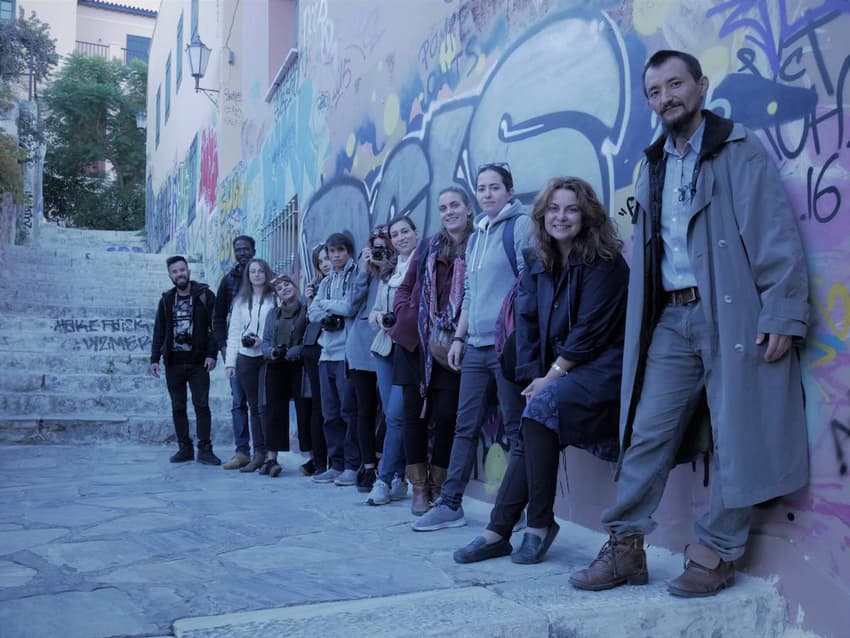
Athens-based media organisation Solomon runs a training scheme for migrants and refugees that aims to give them the tools to tell their own stories themselves.
This article is part of Changing the Narrative. Articles in this series are written by student or early career journalists who took part in The Local's training course on solutions-focused migration reporting. Find out more about the project here.
Iliana Papangeli, the managing director of the magazine Solomon, is sitting in her home in Greece. The national lockdown means that she has to text the government for permission whenever she needs to leave her house: “I have to write 2 if I want to go to the supermarket and 6 if I am going outside to exercise. It is really kind of absurd.” Yet the situation has not stopped her and the rest of Solomon from working hard these past months and developing their next cycle of workshops.
Solomon was originally created in 2016 by Fanis Kollias, a Greek national and social entrepreneur. It was created as a response to the ongoing crisis over refugees, and the lack of representation. Kollias’s original aim was to create an online media platform where refugees themselves could write about the topics that were important to them and their lives.
MORE IN THIS SERIES:
-
How refugees in Germany are bridging the cultural gap with poetry
-
'I feel liberated': How young migrants in France produced their own movie
-
Hack Your Future, Belgium's coding school for refugees
For the past four years Solomon has reported from the ground about the living conditions of newcomers and on the issues that affect refugee and migrant communities in Greece. Reporters were mainly found through networking and word of mouth, and many members of the team had a refugee background themselves.
Back in the early days of the magazine Nasruddin Nazami and Nadir Noori, who are both originally from Afghanistan, joined the board of Solomon. And while Kollias might have thought his idea of a magazine for refugees was brilliant, Noori thought otherwise: “Nadir actually told Fanis that this was the stupidest idea,” Papangeli recalls.
What Noori meant by this was that the true struggle was to get people together, not to separate them. Hence the magazine should instead be focused on creating a platform where everyone, refugees, Greeks and everyone else, could come together and report on what was important for their common life.
“This was the first turning point for Solomon,” says Iliana Papangeli. However, this created a new need: “If we invite them to contribute, by writing an article or creating a photo series, why not give them the skills to do it right?” And thus Solomon LABs were created.
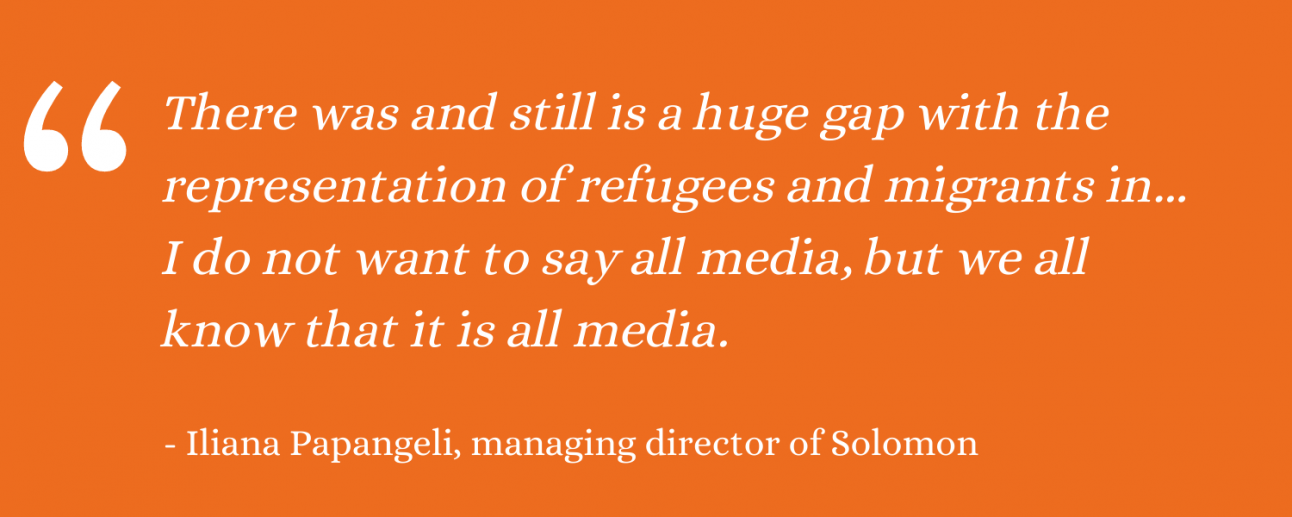
Solomon Media LABs teaches both refugees, migrants and local Greeks about basic media skills through a series of workshops. “There was and still is a huge gap with the representation of refugees and migrants in... I do not want to say all media, but we all know that it is all media. So we thought that it could be a first step in the right direction. To familiarize the people with how to represent themselves and their community, to be able to take part in the public discourse, and to have the opportunity to tell the story from their own perspective,” Papangeli explains.
When I spoke to her, Solomon Media LABs had run three cycles of workshops and had just finished the interview process for the fourth cycle which started on November 19th and will end in February 2021. While this cycle will be held through online webinars due to Covid-19 restrictions and the safety of participants, the previous cycles have been in-person workshops split equally between three different topics: photography, storytelling and videography, amounting to 30 workshops in total. The participants finish their cycle by creating a media product of their own choosing over a period of four months.
The previous cycles have been funded by the European Journalism Centre, and a cycle costs around €30,000 to run. At the beginning each workshop cycle had 20 participants, but Solomon LABs found that a lower number of participants meant that fewer dropped out; they therefore decreased the number of participants to 12 and as a result the last workshop cycle did not see a single dropout. However, as Solomon's board – consisting of Papangeli, Kollias, Noor and Nizami – discovered, the project still had room for development.
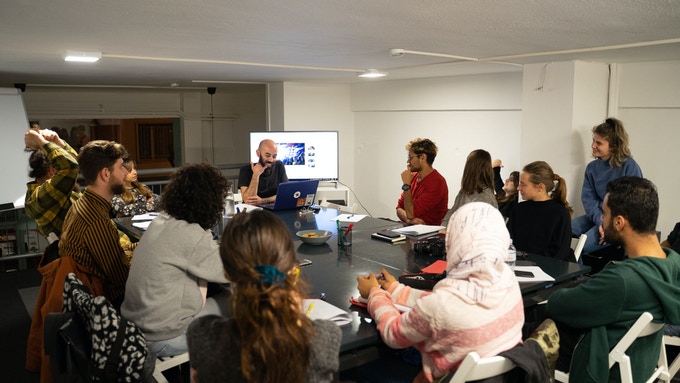
Solomon found that small groups were key to maintaining engagement. Photo courtesy of Solomon
When it comes to the selection processes for participants it is very specific: an open call is put out on Solomon’s social media channels and website along with a set of requirements. Then the team behind Solomon decides on a shortlist of people who are invited for an interview, leading to the final selection of participants.
In the early stages of selection Solomon makes sure to have certain diversity criteria to secure diversity in gender, skills, educational background, expertise, and nationalities in the selected participants. “Yet we do not actually need these criteria, because the diversity comes so easily and naturally,” says Papangeli. “It makes us feel like people are truly recognizing what we are doing here, and that they realise anyone can be part of what we are trying to do.”
The current cycle is a little bit different. During the pandemic Papangeli and her team have not only secured funding for a new cycle, they have also slightly changed the concept for the next round of workshops. This is because they have learned some valuable lessons that they have taken to heart from the previous rounds: the interest in the workshops were not necessarily determined by the topic, but just as much by it being a chance to learn new skills and spend time productively.
“There are very few and very limited opportunities for these people to see themselves in a different way than just being refugees. So I do really believe – and we have seen this a lot – that giving them something productive to do is an essential thing,” Papangeli explains. However, this also has precautions for the workshops and their outcome: “They might find it interesting to join a workshop, but it does not matter if this is a workshop about journalism, fixing a bike or how to cook. It just matters that it is a workshop.”
MORE IN THIS SERIES:
-
IN PHOTOS: Everyday resilience in a Lesvos refugee camp
-
Why women in Danish asylum centres are taking up football
-
Promoting an insider's view of Parisian suburbs
Instead of getting frustrated with the lack of engagement towards the specific topic of journalism, Solomon used it as an inspiration to further develop their project. “This is something we have discussed a lot. And we have now learned that the question is not if refugees can be a journalist or if a refugee can take the position of a journalist. The question is how they can collaborate, the refugee and the journalist, each one coming from their own side and creating something together,” says Papangeli.
Hence the new cycle of workshops will be for established journalists while refugees and migrants will be guest lecturers, along with experienced international journalists, filmmakers and others. The dream for Solomon LAB is to be able to run both kinds of workshops, ones for refugees and migrants and ones for established journalists alongside each other, but that of course all depends on the funding.
These insights have in turn affected the way that Solomon and Papangeli measure success: “It is not a matter of being able to say 'oh look, I managed to train 20 refugees and now they are going to be journalists', because, well, that is a lie. They are not going to be journalists in most cases. However, this does not reduce the fact that it is really important for themselves and also for their community to be engaged in social life in Greece or wherever they are.”
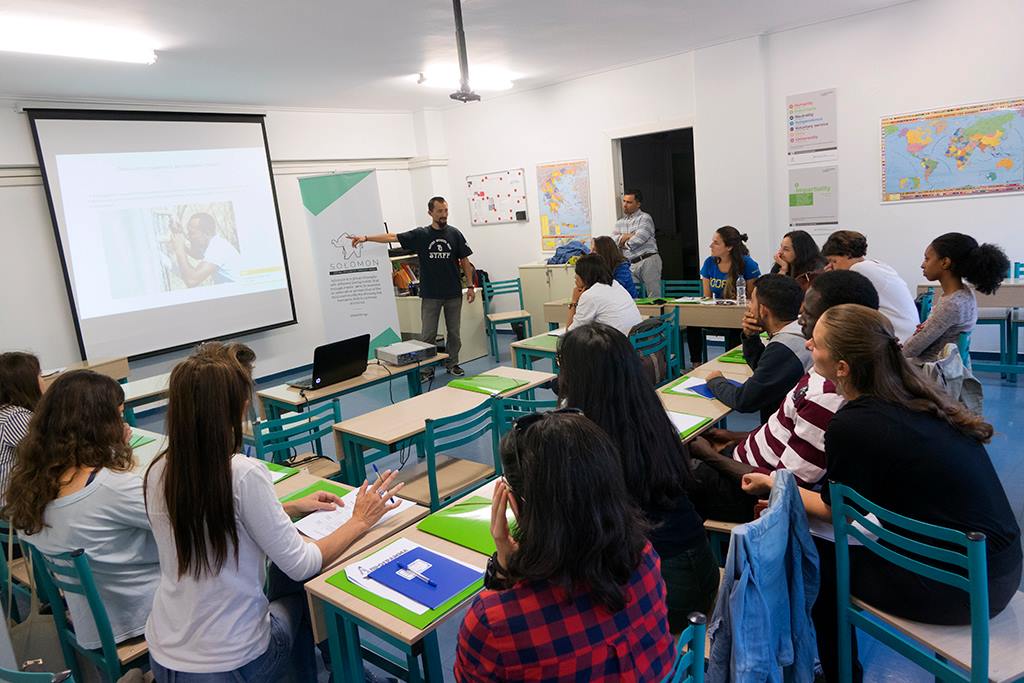
Solomon's workshops now focus on collaboration between refugees and journalists. Photo courtesy of Solomon
This has also turned out to be one of the areas where Solomon receives a lot of good feedback from their participants, both from the surveys after the workshops but also from group discussions in general: the interaction between refugees and Greeks is just as important as the workshops themselves, because it creates a sense of a community and being part of something meaningful.
One of the previous students, Nouralhuda Omran, an 18-year-old Palestinian woman now living in Germany with her family, confirms this: “I did not join the workshops because I wanted to be a journalist myself, but it gave me a way to become a better storyteller.”
While Omran is not seeking a career in journalism, she still values the experience of the LABs, and according to her the ability to tell her own story has been an important takeaway: “It gave me the tools, the power and confidence to tell my own story. I think it is the same for others in the same situation. I know now that if I need to I can speak up and tell the story of my own life. For example, I created a video about being in Covid lockdown in Germany earlier this year that I shared with the people from Solomon.”
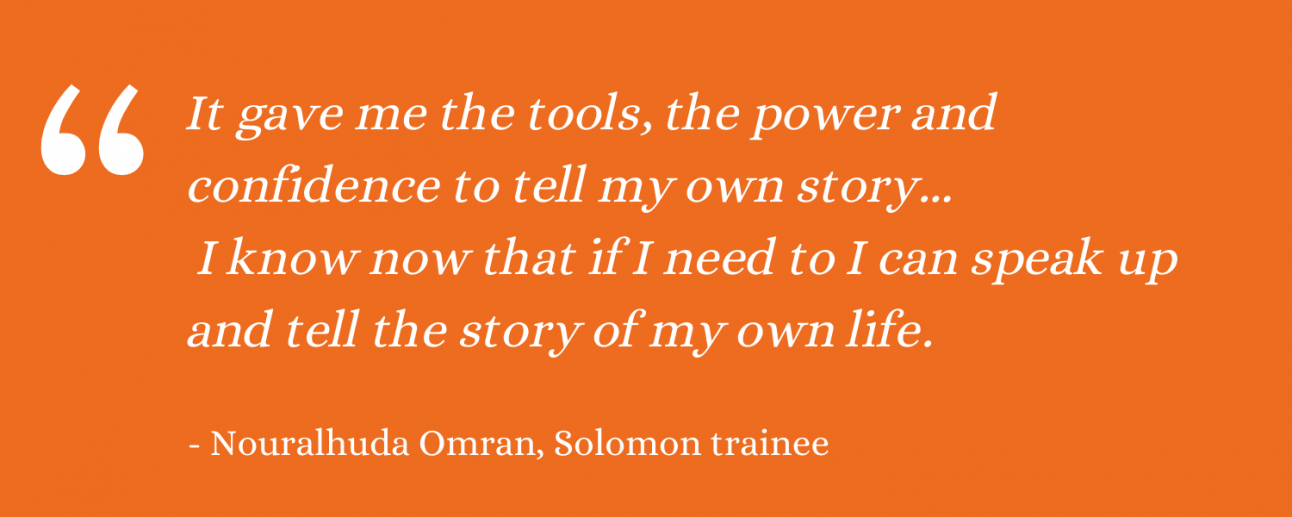
Marialena Yannoulatou, a Greek national who is also a former student of the LABs, suggests: “For me what Solomon does better than any other media outlet within Greece is that it is voices from within the community who speak. I am always a bit cautious when it comes to matters that have to do with refugees because I feel that we should identify our privilege and not try to overreport. What I really enjoyed and what made me at ease was the fact that it was an inclusive group, where people could tell their own stories.”
She observed an interesting difference between how Greeks and refugees approached the workshops: “The most striking experience was seeing how people approached journalism as a tool. As a tool for integration. As a tool for speaking their minds. For me it was rather about networking and trying to establish myself as a journalist, which was something that was a natural continuation from my bachelor’s studies in journalism. But for many of the other participants it was more personal. It was more about putting themselves out there.”
Even with this difference in approach, Yannoulatou and Omran both agree that the sense of community that was created during the workshops was extraordinary. “I was the youngest participant and I felt so honoured to be learning from such competent people. But it never felt like being in class, it felt more like being with family and friends, we were really close,” Omran remembers.
Yannoulatou says that the whole atmosphere was special: “The combination of not being lectured by the people that were offering the workshop, but rather creating the content of the lesson somehow on the spot – of course classes were pre-planned, but on the spot things would always come up that somehow nourished and furthered the communication. We became really good friends, all of us.”
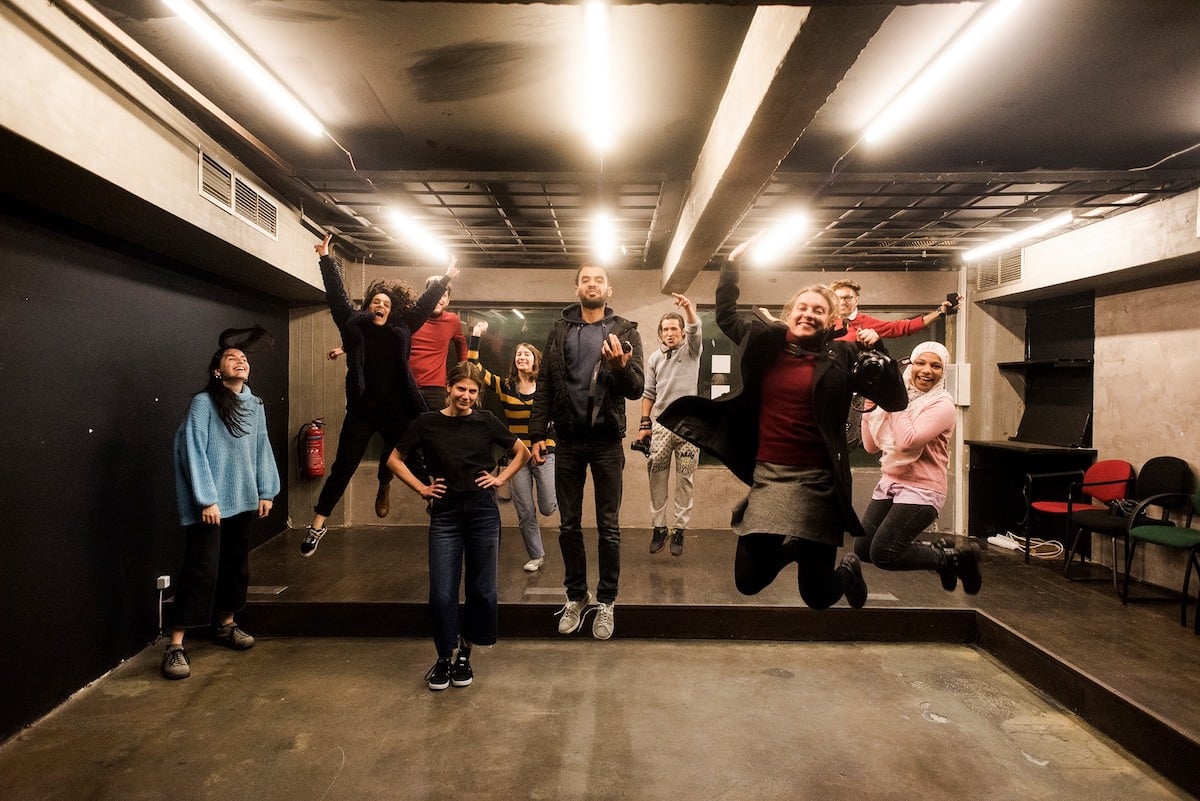
Participants in a group session. Photo courtesy of Solomon
Both Yannoulatou and Omran have stayed in touch with people from their workshops and from Solomon. Omran excitedly explains: “I talk to Iliana Papangeli often, they also still send good opportunities my way, latest I was able to take a class with a university professor. That was really cool!”
So are there no areas where either of them was disappointed in the workshops? Seemingly not: “There was not really anything that I wanted to change about the workshops. Maybe just to have more time. I was not disappointed by a lot of things to put it that way, which is strange for me,” Yannoulatou laughs.
In fact she ended up choosing her master’s degree in International Studies on Media, Power, and Difference based on her experiences with the Solomon LAB: “I had known of this master’s degree before, but did not really think much of it. After Solomon I saw it through a different perspective. With Solomon I saw that inclusion can happen, and that even if inclusion does not succeed in happening we have the opportunity to report in a positive way and that is what urged me to choose this master’s.”
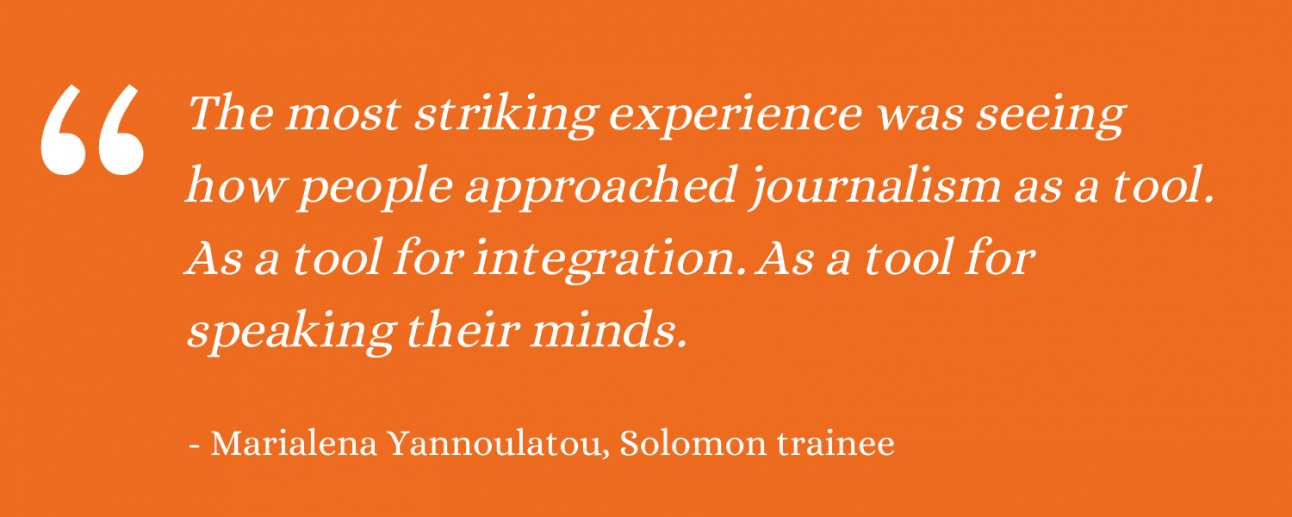
Even if Omran and Yannoulatou do not have any complaints about the workshops, Solomon is still experiencing certain limitations. It is clear that one of the biggest worries for Papangeli and the rest of the team at Solomon is in regards to money. Solomon has so far mainly gotten their funding through grants and foundations, among others, Open Society Foundations and Engage Journalism Accelerator.
Recently Solomon has struggled with getting the needed funding. “At the moment we have managed to secure money to pay the instructors and guest speakers and to pay the participants for their final project so that we can publish it on Solomon. But we have not found the funding to secure my position, for example,” Papangeli explains.
Therefore the current cycle of workshops only consists of ten sessions to keep the quality up and the price down, meaning that the total price of this cycle will be around €10,000, money that Solomon has secured through international development NGO ActionAid. In order to raise extra funding Solomon furthermore launched a membership model through Kickstarter, where they managed to raise €12,085 through 174 backers.
MORE IN THIS SERIES:
-
How a German project uses shared interests to bring refugees and locals together
-
Could matching skilled immigrants with employers help fill the gaps in Sweden's workforce?
-
Bridging between worlds in Switzerland: the promise of transcultural psychiatry
When it comes to the workshops, Papangeli also recognises that commitment can be a challenge, not because people are not driven, but because their circumstances can make it hard to consistently deliver and stay focused. So much of their life is focused on surviving and staying safe, there is not always enough energy left for the LABs: “When you are struggling every hour of the day it is hard to commit to any kind of project,” she says.
By now Solomon is aware that deadlines may need to change. Furthermore, they know that the last big project can be difficult to manage, so Solomon tries to stay in touch and keep supporting the participants after the workshops are done when they work individually on their own projects.
The one thing that continuously stands out about Solomon is their willingness to adjust and adapt their initiative to the needs and circumstances of their participants and readers. In other words, it is clear that these kinds of initiatives have to be open for development. While something might start out as a great idea, it is important to be able to recognise when the initial idea is not 100 percent fitted to the circumstances or that other approaches might be better suited.
The challenge is then to not be discouraged but to take the insights into account and tweak the solution: “I do not think that there are specific ways that you can work on this, you have to adapt, you have to find new ways to engage people in the process,” Papangeli explains.
Nanna Vedel-Hertz is a freelance journalist and photographer based in Denmark.
Comments
See Also
This article is part of Changing the Narrative. Articles in this series are written by student or early career journalists who took part in The Local's training course on solutions-focused migration reporting. Find out more about the project here.
Iliana Papangeli, the managing director of the magazine Solomon, is sitting in her home in Greece. The national lockdown means that she has to text the government for permission whenever she needs to leave her house: “I have to write 2 if I want to go to the supermarket and 6 if I am going outside to exercise. It is really kind of absurd.” Yet the situation has not stopped her and the rest of Solomon from working hard these past months and developing their next cycle of workshops.
Solomon was originally created in 2016 by Fanis Kollias, a Greek national and social entrepreneur. It was created as a response to the ongoing crisis over refugees, and the lack of representation. Kollias’s original aim was to create an online media platform where refugees themselves could write about the topics that were important to them and their lives.
MORE IN THIS SERIES:
- How refugees in Germany are bridging the cultural gap with poetry
- 'I feel liberated': How young migrants in France produced their own movie
- Hack Your Future, Belgium's coding school for refugees
For the past four years Solomon has reported from the ground about the living conditions of newcomers and on the issues that affect refugee and migrant communities in Greece. Reporters were mainly found through networking and word of mouth, and many members of the team had a refugee background themselves.
Back in the early days of the magazine Nasruddin Nazami and Nadir Noori, who are both originally from Afghanistan, joined the board of Solomon. And while Kollias might have thought his idea of a magazine for refugees was brilliant, Noori thought otherwise: “Nadir actually told Fanis that this was the stupidest idea,” Papangeli recalls.
What Noori meant by this was that the true struggle was to get people together, not to separate them. Hence the magazine should instead be focused on creating a platform where everyone, refugees, Greeks and everyone else, could come together and report on what was important for their common life.
“This was the first turning point for Solomon,” says Iliana Papangeli. However, this created a new need: “If we invite them to contribute, by writing an article or creating a photo series, why not give them the skills to do it right?” And thus Solomon LABs were created.

Solomon Media LABs teaches both refugees, migrants and local Greeks about basic media skills through a series of workshops. “There was and still is a huge gap with the representation of refugees and migrants in... I do not want to say all media, but we all know that it is all media. So we thought that it could be a first step in the right direction. To familiarize the people with how to represent themselves and their community, to be able to take part in the public discourse, and to have the opportunity to tell the story from their own perspective,” Papangeli explains.
When I spoke to her, Solomon Media LABs had run three cycles of workshops and had just finished the interview process for the fourth cycle which started on November 19th and will end in February 2021. While this cycle will be held through online webinars due to Covid-19 restrictions and the safety of participants, the previous cycles have been in-person workshops split equally between three different topics: photography, storytelling and videography, amounting to 30 workshops in total. The participants finish their cycle by creating a media product of their own choosing over a period of four months.
The previous cycles have been funded by the European Journalism Centre, and a cycle costs around €30,000 to run. At the beginning each workshop cycle had 20 participants, but Solomon LABs found that a lower number of participants meant that fewer dropped out; they therefore decreased the number of participants to 12 and as a result the last workshop cycle did not see a single dropout. However, as Solomon's board – consisting of Papangeli, Kollias, Noor and Nizami – discovered, the project still had room for development.

Solomon found that small groups were key to maintaining engagement. Photo courtesy of Solomon
When it comes to the selection processes for participants it is very specific: an open call is put out on Solomon’s social media channels and website along with a set of requirements. Then the team behind Solomon decides on a shortlist of people who are invited for an interview, leading to the final selection of participants.
In the early stages of selection Solomon makes sure to have certain diversity criteria to secure diversity in gender, skills, educational background, expertise, and nationalities in the selected participants. “Yet we do not actually need these criteria, because the diversity comes so easily and naturally,” says Papangeli. “It makes us feel like people are truly recognizing what we are doing here, and that they realise anyone can be part of what we are trying to do.”
The current cycle is a little bit different. During the pandemic Papangeli and her team have not only secured funding for a new cycle, they have also slightly changed the concept for the next round of workshops. This is because they have learned some valuable lessons that they have taken to heart from the previous rounds: the interest in the workshops were not necessarily determined by the topic, but just as much by it being a chance to learn new skills and spend time productively.
“There are very few and very limited opportunities for these people to see themselves in a different way than just being refugees. So I do really believe – and we have seen this a lot – that giving them something productive to do is an essential thing,” Papangeli explains. However, this also has precautions for the workshops and their outcome: “They might find it interesting to join a workshop, but it does not matter if this is a workshop about journalism, fixing a bike or how to cook. It just matters that it is a workshop.”
MORE IN THIS SERIES:
- IN PHOTOS: Everyday resilience in a Lesvos refugee camp
- Why women in Danish asylum centres are taking up football
- Promoting an insider's view of Parisian suburbs
Instead of getting frustrated with the lack of engagement towards the specific topic of journalism, Solomon used it as an inspiration to further develop their project. “This is something we have discussed a lot. And we have now learned that the question is not if refugees can be a journalist or if a refugee can take the position of a journalist. The question is how they can collaborate, the refugee and the journalist, each one coming from their own side and creating something together,” says Papangeli.
Hence the new cycle of workshops will be for established journalists while refugees and migrants will be guest lecturers, along with experienced international journalists, filmmakers and others. The dream for Solomon LAB is to be able to run both kinds of workshops, ones for refugees and migrants and ones for established journalists alongside each other, but that of course all depends on the funding.
These insights have in turn affected the way that Solomon and Papangeli measure success: “It is not a matter of being able to say 'oh look, I managed to train 20 refugees and now they are going to be journalists', because, well, that is a lie. They are not going to be journalists in most cases. However, this does not reduce the fact that it is really important for themselves and also for their community to be engaged in social life in Greece or wherever they are.”

Solomon's workshops now focus on collaboration between refugees and journalists. Photo courtesy of Solomon
This has also turned out to be one of the areas where Solomon receives a lot of good feedback from their participants, both from the surveys after the workshops but also from group discussions in general: the interaction between refugees and Greeks is just as important as the workshops themselves, because it creates a sense of a community and being part of something meaningful.
One of the previous students, Nouralhuda Omran, an 18-year-old Palestinian woman now living in Germany with her family, confirms this: “I did not join the workshops because I wanted to be a journalist myself, but it gave me a way to become a better storyteller.”
While Omran is not seeking a career in journalism, she still values the experience of the LABs, and according to her the ability to tell her own story has been an important takeaway: “It gave me the tools, the power and confidence to tell my own story. I think it is the same for others in the same situation. I know now that if I need to I can speak up and tell the story of my own life. For example, I created a video about being in Covid lockdown in Germany earlier this year that I shared with the people from Solomon.”

Marialena Yannoulatou, a Greek national who is also a former student of the LABs, suggests: “For me what Solomon does better than any other media outlet within Greece is that it is voices from within the community who speak. I am always a bit cautious when it comes to matters that have to do with refugees because I feel that we should identify our privilege and not try to overreport. What I really enjoyed and what made me at ease was the fact that it was an inclusive group, where people could tell their own stories.”
She observed an interesting difference between how Greeks and refugees approached the workshops: “The most striking experience was seeing how people approached journalism as a tool. As a tool for integration. As a tool for speaking their minds. For me it was rather about networking and trying to establish myself as a journalist, which was something that was a natural continuation from my bachelor’s studies in journalism. But for many of the other participants it was more personal. It was more about putting themselves out there.”
Even with this difference in approach, Yannoulatou and Omran both agree that the sense of community that was created during the workshops was extraordinary. “I was the youngest participant and I felt so honoured to be learning from such competent people. But it never felt like being in class, it felt more like being with family and friends, we were really close,” Omran remembers.
Yannoulatou says that the whole atmosphere was special: “The combination of not being lectured by the people that were offering the workshop, but rather creating the content of the lesson somehow on the spot – of course classes were pre-planned, but on the spot things would always come up that somehow nourished and furthered the communication. We became really good friends, all of us.”

Participants in a group session. Photo courtesy of Solomon
Both Yannoulatou and Omran have stayed in touch with people from their workshops and from Solomon. Omran excitedly explains: “I talk to Iliana Papangeli often, they also still send good opportunities my way, latest I was able to take a class with a university professor. That was really cool!”
So are there no areas where either of them was disappointed in the workshops? Seemingly not: “There was not really anything that I wanted to change about the workshops. Maybe just to have more time. I was not disappointed by a lot of things to put it that way, which is strange for me,” Yannoulatou laughs.
In fact she ended up choosing her master’s degree in International Studies on Media, Power, and Difference based on her experiences with the Solomon LAB: “I had known of this master’s degree before, but did not really think much of it. After Solomon I saw it through a different perspective. With Solomon I saw that inclusion can happen, and that even if inclusion does not succeed in happening we have the opportunity to report in a positive way and that is what urged me to choose this master’s.”

Even if Omran and Yannoulatou do not have any complaints about the workshops, Solomon is still experiencing certain limitations. It is clear that one of the biggest worries for Papangeli and the rest of the team at Solomon is in regards to money. Solomon has so far mainly gotten their funding through grants and foundations, among others, Open Society Foundations and Engage Journalism Accelerator.
Recently Solomon has struggled with getting the needed funding. “At the moment we have managed to secure money to pay the instructors and guest speakers and to pay the participants for their final project so that we can publish it on Solomon. But we have not found the funding to secure my position, for example,” Papangeli explains.
Therefore the current cycle of workshops only consists of ten sessions to keep the quality up and the price down, meaning that the total price of this cycle will be around €10,000, money that Solomon has secured through international development NGO ActionAid. In order to raise extra funding Solomon furthermore launched a membership model through Kickstarter, where they managed to raise €12,085 through 174 backers.
MORE IN THIS SERIES:
- How a German project uses shared interests to bring refugees and locals together
- Could matching skilled immigrants with employers help fill the gaps in Sweden's workforce?
- Bridging between worlds in Switzerland: the promise of transcultural psychiatry
When it comes to the workshops, Papangeli also recognises that commitment can be a challenge, not because people are not driven, but because their circumstances can make it hard to consistently deliver and stay focused. So much of their life is focused on surviving and staying safe, there is not always enough energy left for the LABs: “When you are struggling every hour of the day it is hard to commit to any kind of project,” she says.
By now Solomon is aware that deadlines may need to change. Furthermore, they know that the last big project can be difficult to manage, so Solomon tries to stay in touch and keep supporting the participants after the workshops are done when they work individually on their own projects.
The one thing that continuously stands out about Solomon is their willingness to adjust and adapt their initiative to the needs and circumstances of their participants and readers. In other words, it is clear that these kinds of initiatives have to be open for development. While something might start out as a great idea, it is important to be able to recognise when the initial idea is not 100 percent fitted to the circumstances or that other approaches might be better suited.
The challenge is then to not be discouraged but to take the insights into account and tweak the solution: “I do not think that there are specific ways that you can work on this, you have to adapt, you have to find new ways to engage people in the process,” Papangeli explains.
Nanna Vedel-Hertz is a freelance journalist and photographer based in Denmark.
Join the conversation in our comments section below. Share your own views and experience and if you have a question or suggestion for our journalists then email us at [email protected].
Please keep comments civil, constructive and on topic – and make sure to read our terms of use before getting involved.
Please log in here to leave a comment.